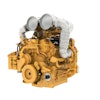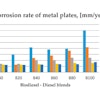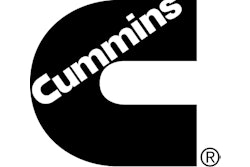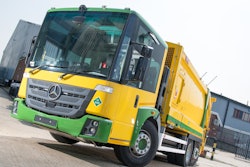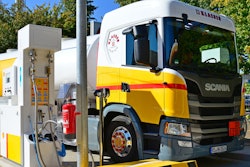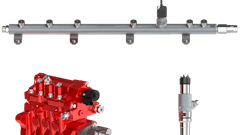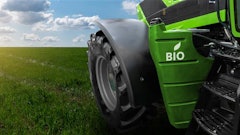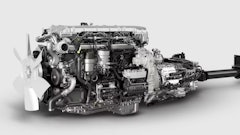The U.S. Department of Energy’s National Renewable Energy Laboratory (NREL) has selected nine projects as part of a multimillion-dollar effort funded jointly by the U.S. Department of Energy (DOE), the California Energy Commission (CEC), and the Southcoast Air Quality Management District (AQMD) to advance the state of technology for natural gas vehicles (NGVs).
The selected projects will focus on reducing the total cost of ownership of NGVs, increasing vehicle efficiency, decreasing local air pollution, and advancing technology development to increase the use of more affordable medium- and heavy-duty natural gas engines and vehicles.
“Leveraging the technical expertise of industry partners can have a powerful impact on transportation technologies,” says Johney Green, Associate Lab Director for Mechanical and Thermal Engineering Sciences at NREL. “Innovation that can change the paradigm for energy use in transportation is going to come by bringing together researchers from several areas. We are looking forward to partnering with these researchers to develop breakthrough NGV technology.”
These awards are the result of collaboration between NREL, DOE, CEC, and AQMD. The partners have a history of working together to identify and fund important natural gas vehicle projects , including supporting many of the technologies on the road today. Projects selected through this solicitation will complement DOE’s Vehicle Technologies Office (VTO) research started in FY 2017. The following projects were selected for negotiation with NREL:
Cummins High Efficiency, Ultra Low Emissions Heavy-Duty Natural Gas Engine Research and Development Project
Cummins, Inc. – Columbus, IN
Cummins Inc. will address natural gas engine emissions and efficiency improvements by developing a natural gas specific combustion design utilizing optimized in-cylinder charge motion and cooled exhaust gas recirculation (EGR). The engine will be integrated on a global heavy-duty base engine platform, enabling up to a 20 percent system cost reduction. The technical targets of the project include demonstrating a 10% improvement in cycle average and peak brake thermal efficiency over the current commercially available product; maintaining 0.02 g/bhp-hr NOx capability with reduced aftertreatment cost; and demonstrating a diesel-like torque curve.
CNG Full Fills with a Complete Smart Fueling System
Gas Technology Institute – Des Plaines, IL
The Gas Technology Institute (GTI) and its partners will address total cost of ownership by developing and demonstrating a smart fueling system, including the full suite of necessary technologies to enable consistent full fills of natural gas vehicles. These technologies include a smart vehicle and dispenser, an advanced full fill algorithm and cost-effective gas pre-cooling using a near-isentropic free piston expander/compressor. This combination of technologies seeks to solve the technical challenges of dispensing uncertainty and heat of compression that results in natural gas vehicles being under-filled.
Downsized, Optimized, High Efficiency, Spark Ignited Natural Gas Engine
Gas Technology Institute – Des Plaines, IL
GTI and its partners will address natural gas engine and vehicle availability by developing a production intent, optimized, spark ignited natural gas engine demonstrating near-zero emissions and meeting EPA 2027MY greenhouse gas (GHG) targets in a Class 6 vocational vehicle.
A Compression-Ignition Mono-Fueled NG High-Efficiency, High-Output Engine for Medium and Heavy-Duty Applications
Michigan Technological University – Houghton, MI
Michigan Technological University and Westport will address natural gas engine emissions and efficiency improvements by demonstrating the feasibility of compression ignition of directly injected natural gas. This research will enable development of mono-fuel natural gas internal combustion engine technology.
Development of a Pent-Roof Medium-Duty Spark-Ignited Natural Gas Engine in an Optimized Hybrid Vehicle System
Southwest Research Institute – San Antonio, TX
Southwest Research Institute and Isuzu will address natural gas engine emissions and efficiency improvements and engine availability by developing and demonstrating a hybrid medium-duty truck using advanced natural gas spark-ignited engine. A pent-roof cylinder head version of a diesel engine will be developed for operation on natural gas and integrated into a medium-duty truck chassis. The pent-roof design will enable the use of elevated levels of EGR dilution to yield a high efficiency engine that can also meet future NOX regulations. To further the vehicle level efficiency gains, a hybrid drivetrain system will be integrated into the truck as well to provide a demonstration of a highly optimized low GHG emission medium-duty truck.
A Multi-Cylinder Transient Plasma Ignition System for Increased Efficiency and Reduced Emissions in Natural Gas Engines
Transient Plasma Systems, Inc. – Torrance, CA
Transient Plasma Systems and Argonne National Laboratory will address natural gas emissions and efficiency improvements by developing a production intent prototype of a transient plasma ignition system to enable stable ignition of natural gas and air mixtures that challenge traditional spark plugs. This project will demonstrate the increase in combustion stability at high-pressure, high-exhaust gas recirculation conditions across a wider operating range relative to existing or future heavy-duty natural gas spark-ignition internal combustion engines.
Plug-in Hybrid CNG Drayage Truck “PHET”
US Hybrid Corporation – Torrance, CA
US Hybrid Corporation and its partners will address total cost of ownership by developing and demonstrating a fully integrated and optimized natural gas, plug-in hybrid Class 8 vehicle utilizing the Cummins 9-L near-zero emission engine, a commercialized parallel hybrid powertrain with 240 hp rating and a 40 kWh liquid-cooled high-power density lithium-ion battery pack. The project includes a 24-month demonstration in port drayage operations to quantify emission and performance improvements and will implement a GPS-based predictive geofencing hybrid control architectures to ensure zero emission operation at the port.
High-Efficiency Natural Gas Dual Fuel Combustion Strategies for Heavy-Duty Engines
University of Alabama – Tuscaloosa, AL
The University of Alabama, in collaboration with an industrial partner, will address natural gas emissions and efficiency improvements by developing a laboratory scale proof-of-concept for a commercially viable high-efficiency natural gas dual fuel heavy-duty engine that will conform to current and future emissions standards. The strategies to achieve this include use of a high cetane oxygenated pilot fuel, spray-targeted reactivity stratification, variable valve actuation, and temperature-controlled exhaust gas recirculation.
Development of Zeolite-Based Catalysts for Improved Low Temperature CH4 Conversion
University at Buffalo – Buffalo, NY
The University of Buffalo and its partners will address natural gas emissions and efficiency improvements by developing a novel aftertreatment system for future natural gas vehicles using palladium-based catalysts, which have shown the best activity for the oxidation of CH4 at low temperatures.
NREL is the U.S. Department of Energy's primary national laboratory for renewable energy and energy efficiency research and development. NREL is operated for the Energy Department by The Alliance for Sustainable Energy, LLC.
